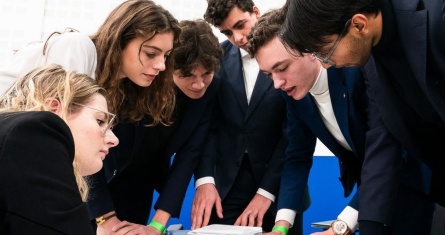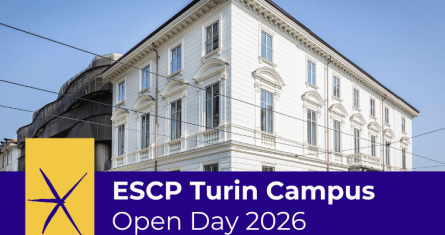At ESCP in Turin, 417 students unite with 48 organisations to solve real-world challenges, creating impact far beyond the classroom
What happens when international business students team up with cross-sector organisations, guided by one of Europe’s leading business schools?
You get Collective Projects: a transformative ESCP initiative rooted in the Turin Campus and now in its ninth edition. This hands-on consultancy programme pairs second-year Bachelor in Management students with startups, SMEs, non-profits and public institutions—mostly from Piedmont, but also from other Italian regions—to tackle real business and societal challenges.
A growing ecosystem of learning and impact
Since its launch, the Collective Projects initiative has become a powerful example of how business education can engage with society—creating meaningful connections between international students and a wide variety of organisations.
From environmental innovation to inclusive growth, the projects respond to real challenges faced by partner organisations—transforming them into opportunities for shared learning, practical experience and tangible value.
“The Collective Projects are more than an educational tool—they are a living laboratory for change,” says Prof. Alberta Di Giuli, Dean of ESCP Turin Campus.
“Our students engage with the complexity of real challenges, while the organisations benefit from fresh insights and high-quality deliverables.”
In just the last three editions (2022–2024), the programme has involved over 920 students,145 projects delivered and 130+ organisations supported.
Each edition has built on the last, broadening its reach and refining its impact. The 2025/26 edition marks a new high point:
- 417 students from 64 nationalities
- 61 projects
- A diverse mix of participating 48 organisations:
- 36,1% startups
- 34,4% small and medium enterprises (SMEs)
- 24,6% non-profit and third-sector organisations
- 4,9% consulting companies
While most partner organisations are based in Piedmont, the initiative also engages actors from Lombardy, Liguria, Tuscany, Emilia-Romagna, Apulia, highlighting the programme’s growing geographical reach and cross-sector relevance.
Each collaboration addresses a concrete business or societal challenge—ranging from market positioning and digital communication to business development, sustainability, or internationalisation. While many projects blend multiple categories, from marketing to fundraising, all give students the opportunity to contribute meaningfully to real-world progress, while organisations benefit from fresh insights, analytical rigour and entrepreneurial drive.
Learning by doing: a dynamic platform for students and organisations
Social good meets business rigour
While students gain hands-on experience and build real-world skills, participating organisations—whether startups, SMEs, social enterprises or non-profits—benefit from fresh insights, strategic tools, and dedicated support they often wouldn’t access otherwise.
Projects are tailored around five key pillars:
- Business development
- Marketing and communication
- Fundraising and financial sustainability
- Internationalisation
- Innovation and knowledge management
“We translate the needs of organisations—be they businesses or non-profits—into clear challenges, match them with student teams, and support the process through mentoring and guidance.”- says Lisa Orefice, Director of Réseau Entreprendre Piemonte. "Our goal is simple: to create shared value by transforming students’ energy into tangible results for startups, companies, and third-sector organisations across the region.”
Building lasting partnerships for shared growth
At the heart of the Collective Projects is a collaborative ecosystem that brings together education, entrepreneurship and community engagement. With the support of Fondazione Compagnia di San Paolo and the coordination of Réseau Entreprendre Piemonte, the initiative fosters meaningful connections between ESCP students and a wide network of organisations.
Réseau plays a key role in translating organisational needs into clear, actionable briefs and guiding teams throughout the process—ensuring that each project delivers mutual value. This structured yet flexible model has helped cultivate a community that is not only more resilient, but also more connected and forward-looking.
Crucially, the impact doesn’t end when the projects conclude. Many organisations return for multiple editions, integrating student contributions into their operations, deepening the collaboration over time, and even recruiting talent from their project teams. This continuity is a testament to the initiative’s long-term value and replicability, reinforcing its role as a driver of regional innovation and sustainable growth.
Equipping students for real-world impact
To ensure students are fully prepared to navigate the complexity of these real-world challenges, the 2025/26 edition will include a dedicated cycle of four practical masterclasses delivered by Réseau Entreprendre Piemonte and ESCP academic tutor.
These sessions will provide essential tools and frameworks for strategic thinking and effective collaboration:
- Understanding Customer Needs
- Business Model Canvas
- AI for Project Management
- Project Management Essentials
These training sessions are designed to bridge theory and practice, helping students adopt a consultant mindset and deliver high-quality, actionable outcomes for their host organisations.
FAQ
What are the Collective Projects at ESCP?
They are six-month consultancy-style projects where second-year Bachelor students work in teams with external organisations to solve real-world challenges.
What is the main goal of the Collective Projects?
To generate lasting impact by uniting international students and local organisations around real challenges that drive regional and social progress.
What types of challenges do projects address?
Projects span business strategy, marketing, digitalisation, fundraising, internationalisation, and innovation, often with a sustainability or social focus.
Who benefits from this initiative?
Students gain hands-on consulting experience. Organisations gain strategic insights and support. The region benefits from stronger ecosystems.
Who can participate as a partner organisation?
When the annual call for applications opens, startups, SMEs, non-profits, corporates and public institutions can apply to host a project and benefit from the support of ESCP student teams.

Campuses


